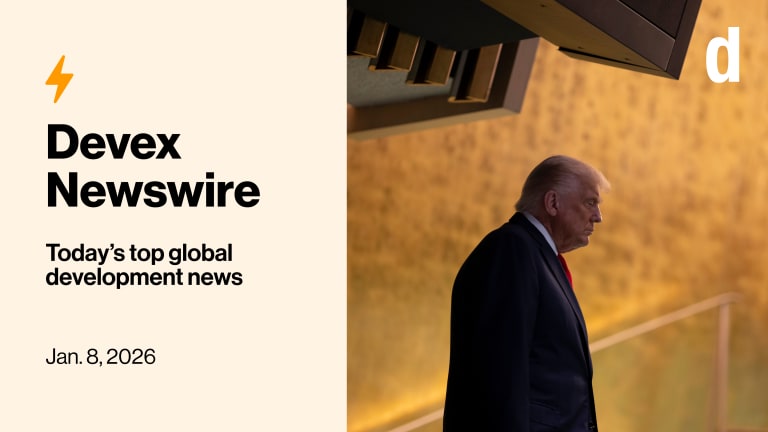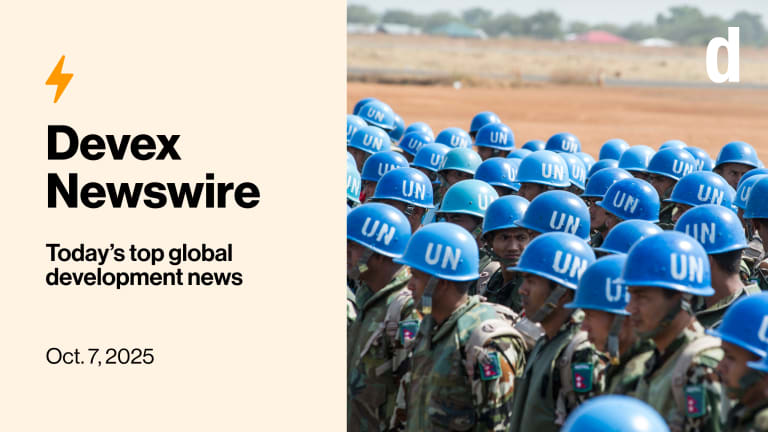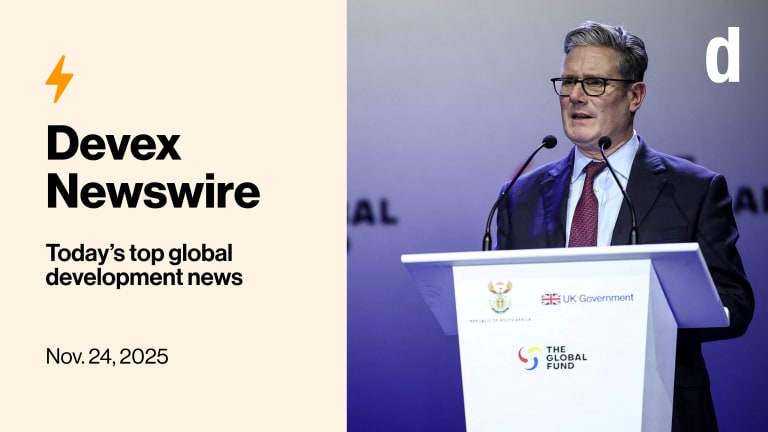
We’re all prepping for a radically different White House under soon-to-be U.S. President Donald Trump. The United Nations is no exception.
Also in today’s edition: Kenya’s president praises members of the World Bank for stepping up to help the lowest-income countries.
+ Looking for a unique perspective on what will shape global development in 2025 to get you and your team prepared? Join us this Wednesday, Jan. 8., for an ask-me-anything discussion with our President and Editor-in-Chief Raj Kumar on the key trends ahead.
UN’t seen nothin’ yet
This is a preview of Newswire
Sign up to this newsletter for an inside look at the biggest stories in global development, in your inbox daily.
One thing is certain about Donald Trump: The famously unpredictable president is going to take multilateral institutions like the United Nations on a roller-coaster ride. There are sure to be stomach-flipping drops, and possibly some unexpectedly pleasant highs.
The U.N. probably shouldn’t count on the latter, at least not in the beginning. If what’s past is prologue, Trump 2.0 could enforce steep cuts to the world body right off the bat. My colleague Colum Lynch writes that Trump’s “America First” agenda is expected to kneecap key U.N.-backed initiatives, from climate change and development assistance to sexual reproductive rights and reform of the international financial system.
But when it comes to predictions, Trump usually defies them.
“Anyone who tells you that they know what will happen at the UN in 2025 is a fool or a liar,” Richard Gowan of the International Crisis Group tells Colum.
We’re neither, but we’re still going to take a stab at making a few educated guesses.
Trump’s term will likely be a boon for close ally Israel. Another likely winner? Christian faith-based groups. Possible losers include the Paris climate agreement and the U.N. Population Fund — and even potentially the World Health Organization.
On the whole, Trump tends to have a transactional view of multilateralism. That can be a double-edged sword. If something doesn’t support U.S. national interests, it could be on the chopping block. On the flip side, any desire to withdraw from U.N. institutions will likely be tempered by concerns that a rising China would seek to fill the void.
“Trump could run riot in the UN system, pulling apart international agreements and defunding international agencies willy-nilly, or he could take a few symbolic potshots at the UN and move on,” Gowan says. “Equally, UN members could rally around the institution to preserve it as they did during the first Trump era. But they may also just conclude that the system, or at least large parts of it, are unsustainable.”
Read: The year of UNcertainty
ICYMI: Will Trump gut UN family planning funds ... again?
Related opinion: The Trump effect on global health and development in 2025
Kenya hear it?
The recent replenishment of the World Bank’s International Development Association, or IDA, its low-interest lending arm for the lowest-income countries, elicited either glass-half-full optimism or glass-half-empty pessimism.
On the one hand, it raised a record $23.7 billion, which adds up to $100 billion once the bank leverages those pledges on capital markets. On the other hand, it fell short of the $120 billion that African leaders had called for.
But Kenyan President William Ruto argues this replenishment is still a welcome step forward.
“Over the years, IDA has been a lifeline for many African countries, offering long-term, concessional financing that empowers nations to invest in critical sectors such as health, education, and infrastructure,” he writes in a Devex opinion piece.
But, he points out, that step forward is not the final destination. Ruto — who serves as chair of the Committee of the African Heads of State and Government on Climate Change — says bold action is needed given the magnitude of challenges Africa faces, from extreme weather events to debt distress. He points out, for example, that low- and middle-income countries paid a staggering $1.4 trillion in foreign debt servicing last year.
Among his recommendations: more renewable energy investments, reviewing and fixing the current credit ratings applied to African countries, greater leverage of Special Drawing Rights, and other structural reforms.
“The record replenishment of IDA provides a foundation to build upon, but it must not mark the end of our ambitions,” he writes.
Opinion: Historic $100 billion IDA pledge is proof we can come together
ICYMI: World Bank calls IDA pledges a win. Critics aren’t so sure
Risky proposition
“When people don’t understand a risk, they avoid [it].”
— James Mwangi, CEO of Equity Bank Group HoldingsAfrican governments have long argued that inflated risk perceptions unfairly spook the private sector from investing in the continent. In fact, the African Union is setting up an African Credit Rating Agency partly to challenge perceptions of the continent.
But Mwangi tells Devex that a separate system isn’t the answer.
“A parallel market is not a solution, because you want to plug into global markets,” says Mwangi, whose organization is one of Africa’s largest financial institutions.
Those global markets are necessary, he says, to attract more capital, but to access them, Africans must educate the ratings agencies with more data.
“Because we don't know about the risk, we put a premium on risk pricing, and consequently, Africa has been paying significantly higher, yet the projects being financed are expected to compete globally so, essentially, you disadvantage an entire continent in terms of global competitiveness,” Mwangi says.
Read: Risk aversion and credit ratings — why Africa is paying more for debt (Pro)
+ Not yet a Devex Pro member? Start your 15-day free trial today to access all our expert analyses, insider insights, funding data, exclusive events, and more. Check out all the exclusive content available to you.
Replenishment fatigue?
IDA was not the only fund on the hunt for a sizable replenishment in 2024. A stampede of global health organizations launched overlapping campaigns to raise funds for their own replenishments.
WHO; Gavi, the Vaccine Alliance; and the Pandemic Fund all raised money last year, with the latter two continuing their efforts into the new year. Meanwhile, the Global Fund to Fight AIDS, Tuberculosis and Malaria will launch its latest replenishment drive in 2025.
Devex contributor Andrew Green has a detailed breakdown of where all these efforts stand. Gavi, for example, is seeking $9 billion in pledges to complete its work from 2026 to 2030. So far, the fund has raised $2.7 billion, including $30 million from Indonesia — the first pledge in this funding round from a middle-income country.
Gavi has at least one major pledging event still to come. The European Union and the Gates Foundation will co-host the event in Brussels in the first half of 2025.
Meanwhile, the Global Fund, which pioneered the replenishment approach, will launch its eighth fundraising cycle in 2025. Christoph Benn, who ran several Global Fund replenishments as the former director of external relations, said he sees some key changes to the fundraising environment.
Read: How 2024's big global health replenishments shook out
🎧 I recently spoke to my colleagues Sara Jerving and Elissa Miolene about these replenishments and other global health issues for the latest episode of our This Week in Global Development podcast. Check it out here.
Global voices
Looking for some predictions for global development? Look no further than our Global Voices predictions for 2025 series.
Some highlights:
“The opportunity is clear: Through strategic infrastructure investment, philanthropy can help create the foundation for equitable, sustainable development in 2025 and beyond.”
— Tsitsi Masiyiwa, African philanthropist
“Localizing data, language, and skills is crucial to ensuring AI meets the needs of billions who don’t speak English or Mandarin, while also creating more robust and accurate AI models.”
— Uyi Stewart, chief data and technology officer, data.org
“Future global prosperity relies heavily on the prosperity of Africa’s unelectrified population. By embracing innovative policies, strategic investments, and bold partnerships, it’s possible to connect 300 million people by 2030.”
— Andrew Herscowitz, CEO, Rockefeller Catalytic Capital's Mission 300 Accelerator
We hope these expert perspectives will inform and inspire your work in the year ahead.
In other news
The U.S. will ease restrictions on Syria to allow aid to flow into the country. [Bloomberg]
World Central Kitchen founder José Andrés, billionaire philanthropist George Soros, and former U.S. Secretary of State Hillary Clinton are among the recipients of the Presidential Medal of Freedom. [New York Times]
Israel mulls restricting humanitarian aid to Gaza once U.S. President-elect Donald Trump takes office. [CNN]
Sign up to Newswire for an inside look at the biggest stories in global development.
Search for articles
Most Read
- 1
- 2
- 3
- 4
- 5








